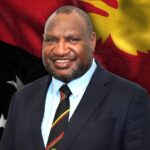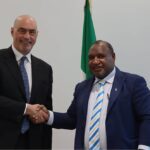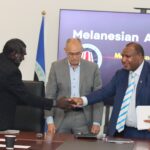Prime Minister Hon. James Marape today (12.05.25) launched the first-ever National Manufactur- ing Policy in a milestone moment that marks Papua New Guinea’s deliberate attempt at moving into manufacturing industries.
The National Manufacturing Policy 2024, launched under the Department of Commerce and Industry, is the first of its kind of framework any government has put together to initiate and guide the manufacturing sector in the county since Independence.
The policy aligns with the Marape-Rosso Government’s vision for downstream processing of the country’s vast natural resources into finished products for ex- port and local consumption to replace the continuous export of raw materials since 1975.
Prime Minister Marape, a strong advocate of downstream processing since taking office in 2019, has maintained the importance of downstream pro- cessing as the key driver of economic growth for Papua New Guinea’s pros- perity.
The PNG manufacturing sector has remained stagnant for the last 50 years since Independence, contributing an average of two percent to the GDP. With this policy in place, this figure is expected to rise to 10 percent by 2030, according to the Department of Commerce & Industry.
The National Manufacturing Policy 2024 focuses on downstream processing, creation of jobs and industries, and the generation of revenue.
Prime Minister Marape launched the policy alongside another key policy for the Resources Sector, the National Content Policy.
The launch was attended by officers from the department, Minister for Com- merce & Industry, Hon. Win Daki, business representatives, and government ministers.
“These are not just policy instruments but are declarations of intent,” said PM Marape in opening his speech.
“My government’s vision has always been to go down the path of downstream processing and manufacturing of our natural resources – forestry, fisheries, agriculture, in mining and petroleum, and other resources.
“I believe that by doing this, we grow our economy much more, which will in turn, generate revenue to better serve our country.
“As we approach our nation’s 50th anniversary, it is the right time to amend laws that will shape our economy and country. We must ensure that our policies reflect our aspirations for a prosperous future,” said Prime Minister Marape.
The Prime Minister left some room for adjustments while inviting input from players within the sector but emphasized that the ultimate goal of processing raw materials remains unchanged.
“Many other countries process our natural resources to serve their people. It is time for us to change this. Our resources harvested in the country must be processed in the country, and our businesses must benefit and directly be involved in the spin-off businesses.”
The Prime Minister also called on companies who have been operating in the country for some time to work with Government, calling upon their experiences to grow manufacturing in the country. “
These policies we are launching today must be aligned with your business interests and views. If regulations need adjusting, we will do so. But the goal to process our resources and export finished products remains.”
Prime Minister Marape has called on key economic sector agencies such as Forestry, Fisheries, and Agriculture to work towards the full implementation in this policy direction.
“In fisheries and agriculture, we must learn and enter downstream processing. The market is available, and those in fisheries and forestry sectors must get into doing downstream processing. We must also deregulate to allow the private sector in PNG to grow.
“The goal post of manufacturing in our country must never be compromised.
“Together, let us build a stronger, more self-reliant Papua New Guinea through the implementation of this vital policy,” Prime Minister Marape said.







